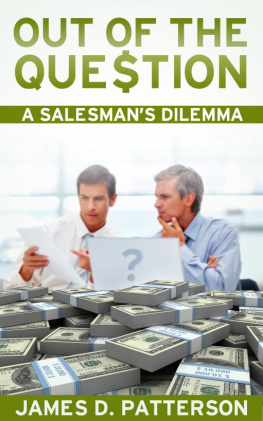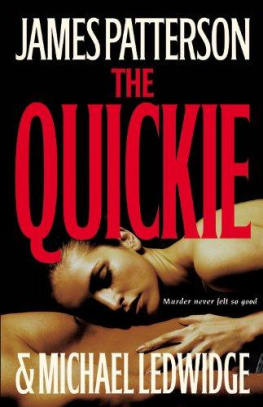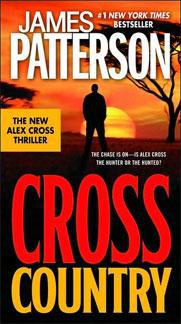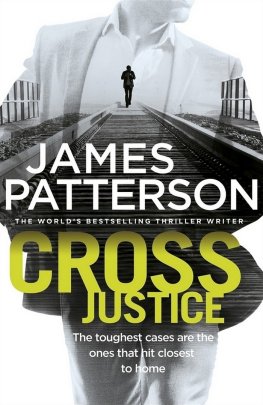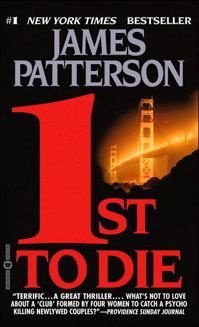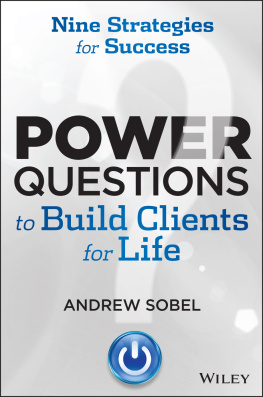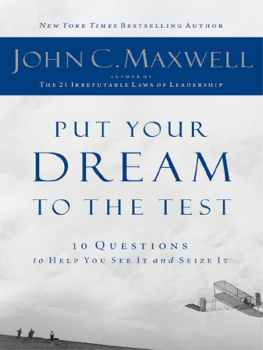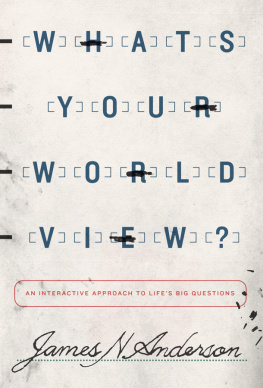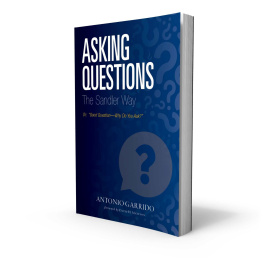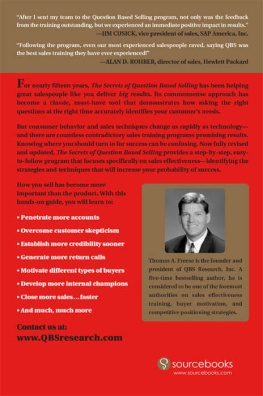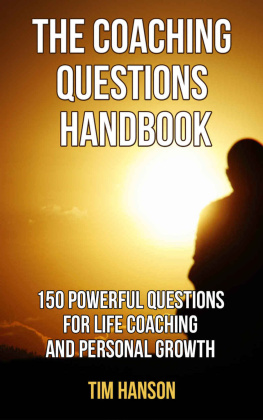Out of the Question
A Salesmans Dilemma
James D. Patterson
.
Smashwords Edition
Copyright 2013 James D. Patterson
License Notes: This ebook is licensed for yourpersonal enjoyment only. This ebook may not be re-sold or givenaway to other people. If you would like to share this ebook withanother person, please purchase an additional copy for each personyou share it with. If youre reading this book and did not purchaseit, or it was not purchased for your use only, then you shouldreturn to Smashwords.com and purchase your own copy. Thank you forrespecting the hard work of this author.
Ebook formatting by www.ebooklaunch.com
Table ofContents
Why Questions
What is the one thing all highly successfulsalespeople have in common? From consumer sales such as cars,appliances and real estate to high level business sales likecomputer systems, aircraft and financial products, effectivesalespeople are skillful with this major component in the salesprocess. And what is this essential component? Questions. JohnChancellor, a famous TV journalist, said, "Strength is not inhaving the right answers, but in asking the right questions.
The key word in the above quote isright. A question is only as good as its outcome. What comesout of the question will lead you further alongthe sales path, leave you mired where you are, or, in some cases,set you back. The critical element determining what you get outof the question is the quality of the question you ask. Thereis no doubt you can increase sales with better questions.
A salespersons role is to guide a prospectalong a desired path that ultimately ends in a sale. As a guide,the salesperson must exercise some degree of control. How does thesalesperson do this in a way that creates cooperation? Goodquestions. Who is in control of the sales process? The personasking questions. Questions direct the process along the desiredpath. Effective questions are essential for the salesperson toachieve the desired results for both the salesperson and theprospect. Better questions produce greater results and more$$$$$.
One of the classic examples of this controlof the process can be seen in the many crime dramas portrayed on TVevery day. The prosecuting attorney uses questions to control thewitness as the prosecutor attempts to sell the jury on thedefendant's guilt. The key difference between the prosecutor and asalesperson is the prosecutor is trained to only ask questions thathe or she already knows the answer. The salesperson asks questionsto discover information the salesperson does not know or confirminformation not already stated. In both cases, questions are thetool of choice.
When I was in charge of the national salestraining for Xerox Corporation, the company asked me and my staffto evaluate a sales training program that was developed by a smallcompany in New York. We liked it so much that Xerox purchased thecompany and the program became the platform for all Xerox salestraining. The program was named Professional Selling Skills (PSS)and it is still regarded as one of the most effective salestraining programs of all time. Prior to introducing it to all ofthe Xerox salespeople, we added a component called EffectiveListening. We felt good listening was required to maximize thebenefits of the selling skills being taught in the PSS program. Abasic principle of PSS is to reinforce the positive and questionthe negative so the true concerns of the prospect could beaddressed. Careful listening was essential. What we learned wasthat effective questioning was even more important. Good questionsbecame the critical element in this all -time classic salestraining program.
Questions also create two way communicationand keep the prospect engaged. I have a basic rule to never talkmore than 60 seconds. Then I ask a question to see if the prospectis truly following me. Don't you hate it when a sales person goeson and on about what he or she is selling without even checking tofind out if you have any interest. Questions break the tendencymost sales people have of talking too much and listening toolittle. You can avoid this pitfall by simply using goodquestions.
Sales fall into many categories and theprocess ranges from very simple to highly complex. A prospect walksinto an Apple store and asks to see the various models of computersthat are available. The salesperson asks questions to learn theprospects needs, how and where it will be used and what additionalrequirements might the prospect have in the future. This is arather simple, straight forward path leading to a sale.
A much more complex sales path is prevalentin real estate sales. A real estate salesperson often faces aseries of sales situations I call the "sales ladder". For example,a salesperson approaches an owner of a property seeking to sell theowner on becoming his/her or their representative in the sale ofthe owner's property. If the salesperson is successful in thatsale, he or she must then convince (sell) other real estate agentson the merits of the property so they will bring their clients tosee the property. The next step on the sales ladder is pointing out(selling) to potential buyers why this particular property mightmeet their needs and desires. If the property is a good match forthe buyer, the salesperson must then encourage (sell) the prospecton making an offer. This step alone has many complexities; price,terms, close of escrow, etc. Having successfully completed thesesales steps, the salesperson must now present (sell) the offer tothe property owner. This step most often results in a counteroffer. So the sales agent must go back to the potential buyer andreview (sell) the counter offer to the buyer. In many cases, thereare multiple counter offers. All the steps on the sales ladderrequire the skillful use of questions. Buying or selling realestate is typically one of the most emotional selling processes andthe salesperson needs to be particularly sensitive to both buyersand sellers responses.
Agreement is finally reached between theseller and buyer and a purchase agreement is executed by bothparties. An escrow is opened and the buyer begins the due diligencephase. Often something is discovered that requires the sales agentto negotiate (sell) a solution to the buyer and/or seller. Asuccessful sale has been concluded when the escrow closes.
I'm sure you've heard the old clich, "How doyou eat an elephant? One bite at a time." The same applies incomplex selling situations. How do you climb the ladder to success?One step at a time. Complex sales are really a series of smallsales or steps up the ladder until you reach a conclusion orsale.
I have been a real estate broker for over 30years and have sold everything from homes to hotels, from vacantland to large apartment complexes, from business opportunities todevelopment possibilities. Values have ranged from $28,000 to$24,000,000. From the simplest to the most challenging, I have usedquestions as a primary tool in guiding my clients to a successfulsale or purchase. You will find many real estate examples in thefollowing chapters.
Let's examine the path that is typicallyfollowed in the selling process.
The first step in the sales process isestablishing rapport. I call this "getting attention". Why wastewords on someone whose mind is elsewhere. Ask questions to see ifthey are open to hearing your presentation. The much overusedquestion "How are you?" aims at establishing rapport but lackssincerity. Nobody really tells you how they are. If they do, it'sprobably more than you wanted to know. The use of good questionswill help put your prospect at ease and be more receptive to yourproposal The goal in establishing rapport is to build trust so theprospect has an open mind before you actually begin guiding theprospect along the sales path. In Chapter 2, you will learn ingreater depth how to use questions to establish rapport.

